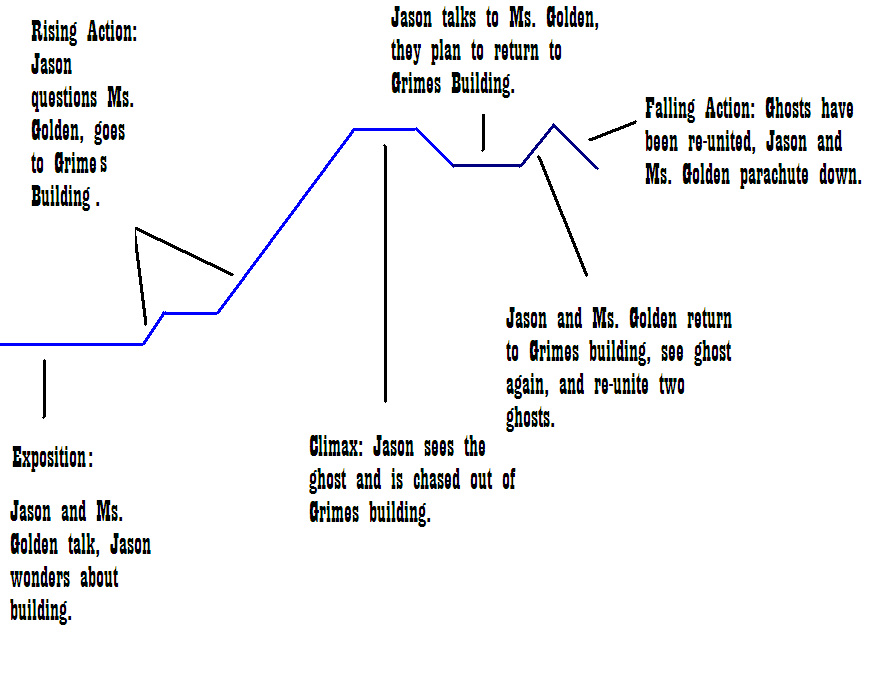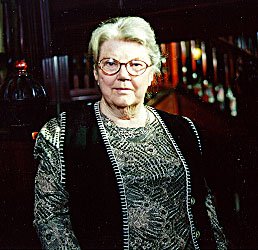Click to set custom HTML
Joan Aiken, the daughter of the poet Conrad Aiken, was born in England and lived with her family in an old haunted house. This experience inspired her to write thrillers and unexplained novels. Aiken began writing at five and published her first story at sixteen. After working in London for a magazine, an advertising company, and the United Nations she decided to pursue what she has called "the family trade." Her writings include novels, poems, plays, and stories. Known for her wit, her first book was called All You Ever Wanted and her second More Than You Bargained For. Joan Aiken, like most other authors, used her own life experiences along with her imagination to write a fantastic story. In "Sonata for Harp and Bicycle", Jason Ashgrove wrote for an advertising company just like Aiken once did.

Setting: this story takes place in the Grimes Buildings in London, England. It takes place around Halloween, which is the fall. The weather is probably getting a little colder and most of the story takes place in a 2 day time period.
The history of London in the following link:
http://www.picturesofengland.com/history/london-history.html
The history of London in the following link:
http://www.picturesofengland.com/history/london-history.html
Definitons:
tantalizing: mockingly or teasingly out of reach
part of speech: adjective
synonym: provoke
antonym: satisfy
Sentence: Molly held the cookie above her little sister's head tantalizingly.
improbable: unlikely to happen
part of speech: adjective
synonym: unlikely, unbelievable, implausible
antonym: plausible, possible
Sentence: It is improbable that Molly's little sister will get the cookie hanging over her head by her big sister.
reciprocate: to give, feel, etc. in return
part of speech: verb
synonym: changeable, convertable, corresponding
antonym: independent, singular
Sentence: Hopefully, Molly's sister will be able to reciprocate the mean attitude of her big sister or she will never get a cookie.
tantalizing: mockingly or teasingly out of reach
part of speech: adjective
synonym: provoke
antonym: satisfy
Sentence: Molly held the cookie above her little sister's head tantalizingly.
improbable: unlikely to happen
part of speech: adjective
synonym: unlikely, unbelievable, implausible
antonym: plausible, possible
Sentence: It is improbable that Molly's little sister will get the cookie hanging over her head by her big sister.
reciprocate: to give, feel, etc. in return
part of speech: verb
synonym: changeable, convertable, corresponding
antonym: independent, singular
Sentence: Hopefully, Molly's sister will be able to reciprocate the mean attitude of her big sister or she will never get a cookie.
Imagery Examples:
“A tiny furtive wedge of darkness beckoned him, a snicket, a hacket, an alley carved into the thickness of the building. It was so narrow, that at any moment, it seemed, the overtopping walls would come together and squeeze it out of existence.” page 543
“Another sound now: a waft of ice-thin notes, riffling up an arpeggio like a flurry of snowflakes.” page 544
Suspense Examples:
"-fire escape," he heard, as they came into the momentary hush of the carpeted entrance hall. And "-it's to do with a bicycle. A bicycle and a harp."
"How about it?" the whisper mocked him. "How about jumping? It's an easy death compared to some."
Time Period Research:
1952- London smog kills 4,000 people from London due to respiratory disease
1953 March 24- Queen Mary dies: she was consort of King George V, and grandmother of the Queen
“A tiny furtive wedge of darkness beckoned him, a snicket, a hacket, an alley carved into the thickness of the building. It was so narrow, that at any moment, it seemed, the overtopping walls would come together and squeeze it out of existence.” page 543
“Another sound now: a waft of ice-thin notes, riffling up an arpeggio like a flurry of snowflakes.” page 544
Suspense Examples:
"-fire escape," he heard, as they came into the momentary hush of the carpeted entrance hall. And "-it's to do with a bicycle. A bicycle and a harp."
"How about it?" the whisper mocked him. "How about jumping? It's an easy death compared to some."
Time Period Research:
1952- London smog kills 4,000 people from London due to respiratory disease
1953 March 24- Queen Mary dies: she was consort of King George V, and grandmother of the Queen
|
Direct and Indirect Characterization:
Direct: 1. "Jason was annoyed." 2. "Jason was frustrated." Indirect: 1. "Miss Golden, Jason thought. She would miss me." Meaning: He was in love with her and he thought she was in love with him too. 2. "And she stared firmly down at the copy in front of her, lips folded, candyfloss hair falling over her face, lashes hiding eyes like peridots, a girl with a secret." Meaning: Jason thought Miss Golden was beautiful. Characterization of All Characters: Jason- Round: Jason is courageous, smart, loving, caring, brave, strong, Static: Jason does not change throughout the story. Miss Golden- Round- Miss Golden is scared, suspicious, loving, caring, smart, weak, Dynamic- Miss Golden in the beginning of the story was very scared of the ghosts and she was very scared for Jason after he got cursed. She really believed that he was going to die and that there was nothing they could do about it. But when Jason fixed the relationship between the ghosts she learned to trust him and to not jump to conclusions and just think the worst thoughts about the situation. Important Quotes: 1. "'But why is it?' Jason Ashgrove, the new copywriter, asked his secretary one day. 'Why are the staff herded out so fast? Not that I'm against it, mind you; I think it's an admirable idea in many ways, but there is the liberty of the individual to be considered, don't you think?'" This is important because it introduces the reader to the main character and shows his personality, which is strong-minded and not afraid to tell people what he thinks. 2. "A bicycle, she had said. A bicycle and a harp." This quote is important because it is the beginning of the whole story when Jason wants to find out what she means. 3. "'And anyone who meets the ghost of William Heron will himself, within five days, leap down from the same fatal fire escape.'" This begins the curse hanging over Jason's head throughout the rest of the story. 4. "Sure enough, when Berenice rang extension 170 a faint, sleepy voice, distant and yet clear, whispered 'Hullo?' 'Is that Miss Bell?' '. . . Yes.' Berenice went a little pale. Her eyes sought Jason's and, prompted by him, she said formally, 'Switchboard here, Miss Bell, your ten o'clock call.' 'Thank you,' whispered the telephone." This showed that the haunting wasn't just a myth, it was really there because they had heard her voice. 5. "Neither Berenice nore Jason. afterward, would speak of what they saw but each was left with a memory, bright as the picture on a Salvador Dali calendar, of a bicycle bearing on its saddle a harp, a bottle of wine, and a bouqet of red roses, sweeping improbably down the corrider and far, far away." This quote officially ends the haunting of the Grimes Building. Point of View: The point of view is third person omniscient. Throughout most of the story, the narrator knows only what Jason is feeling and thinking but then sometimes he knows what Miss Golden is thinking as well. For example when Jason asks Miss Golden what she wants for her birthday she tells him she just wants her conscious cleared over the Oat Crisps but the narrator tells us right after that, that she lied and really wants Jason. One Theme: In Sonata for Harp and Bicycle one theme that is important is not to jump to conclusions. This ties into the story when Miss Golden tells the story about how and why the Grimes Buildings are haunted. She tells Jason the story of the guard and the harpist that were in love. One night the guard went to the room of the harpist to propose to her, but when she did not answer, he jumped to conclusions and asumded that she did not love him anymore. He then jumped off of the fire escape to his death. Jumping to conclusions also plays a big part in our lives today because people tend to jump to conclusions, maybe spread rumors, say stuff that's not true, and just end up hurting someone. Mood: The mood of the story is suspision. Throughtout the book Aiken was trying to confuse the reader by the different roots she tried to lead you down. She kept on switching up the story and adding in new details that totally changed the readers mind about what the ending would be. Symbol: A symbol in the story is the Grimes Building after everyone has left. The dark, deserted halls represent the lonileness and sadness that the ghosts feel because of what happened to them when they were alive. When people are there, it is very hectic and bright, like a work place usually is. This atmosphere masks the lonely atmosphere during the nights, and it symbolizes the ghosts' story. Literary Terms a list of literary terms if you ever want to search them Critique:
“Sonata For Harp and Bicycle” is, overall, little more than a disposable and cliché love story. Problems, unfortunately, begin in the first few sentences. These include poor character development, lack of exposition, and a plot that feels old and overdone. The story begins in the Grimes Building, a quintessential aging London office, with a conversation between main character Jason Ashgrove and secretary Ms. Golden. Despite the fact that they have just been introduced, and have seemingly never before spoken, it is alluded that they are mutually in love. This raises one of the first, and most strikingly prominent, issues with the story. Ms. Aiken’s characters are never developed, appearing only to love each other because the author has forced them to. They exist without any driving force or reasons for their feelings. Overall, the two main characters come off as difficult to believe in their actions and intentions, and feeling more plastic than human. Contributing to this problem is the complete and utter forgoing of a backstory or explanation of the setting. Perhaps this can be partially justified by the story’s mysterious nature, but, overall, it definitely detracts from the experience. Ms. Aiken never takes the time to explain her characters or their relationship. In whole, the story tends to give the reader the impression of having stumbled into another tale at some arbitrary point in the middle. Even, however, if the characters and fundamental writing style were better, this selection would still be dragged down by its story. The plot, a tale of an arbitrary man and an arbitrary woman falling in love, with a ghost thrown in here and there for good measure, feels like something we’ve all read before. Mostly, it feels like we should have read it in about 6th grade. The plot, I think, is about comparable to your average romantic comedy. The character development feels mostly forced and ham-handed, and the story progression is predictable. In conclusion, most are likely to find “Sonata” a less than compelling read. It may have something to offer as light textbook flavoring, but will not hold the attention of many readers. However, perhaps much of the problem is simply “Sonata” being oversold. Targeted at a slightly younger age group, this story would surely be received far more positively. |
